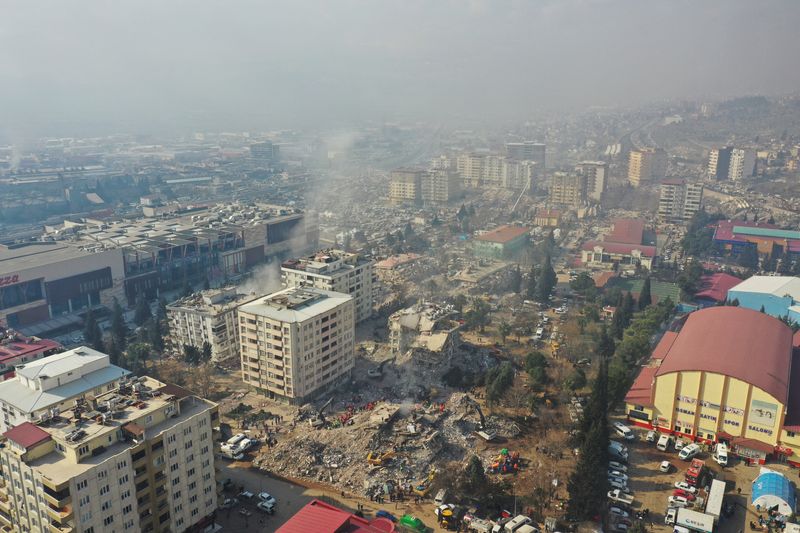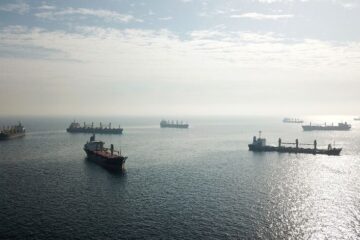Rescuers dig for three survivors in rubble in Turkey a week after earthquake
 A view of the destruction following the earthquake in the town of Kahramanmaras, Turkey February 10, 2023. REUTERS/Issam Abdallah
A view of the destruction following the earthquake in the town of Kahramanmaras, Turkey February 10, 2023. REUTERS/Issam AbdallahRescuers pulled a woman alive from the rubble of a collapsed building in Turkey on Monday and another team was digging a tunnel to reach what was believed to be a trapped grandmother, mother and 30-day-old baby, broadcaster CNN Turk reported.
A week after a major earthquake struck Turkey and Syria, the toll of dead rose to nearly 34,000 and looked set to keep increasing as hopes for finding any more survivors faded.
But CNN Turk reported that Sibel Kaya, 40, was rescued in southern Gaziantep province, some 170 hours after the first of two major quakes struck the region.
Rescue workers in Kahramanmaras had also made contact with three survivors, believed to be a mother, daughter and baby, in the ruins of a building, the broadcaster reported.
The toll in both countries rose to nearly 34,000 on Monday.
The deadliest quake in Turkey since 1939 has killed 29,605 people there. More than 4,300 people were reported dead and 7,600 injured in northwest Syria as of Sunday, said a U.N. agency.
In Kahramamaras, the rescuers hoping to reach the three survivors consisted of a Turkish military team, miners and Spanish firefighters who were first alerted to there being life in the rubble by a search dog, said engineer officer Halil Kaya.
A thermal scan signalled that there were people alive, about five metres within the building, and then a muffled sound was detected, Kaya told the broadcaster.
The miners have excavated around three metres through a neighbouring building that is still standing, putting up support beams as they go.
“When we said knock on the wall if you can hear us, we heard faint tapping,” he said.
“Our colleagues are all here working for 24 hours without sleeping … We will all be here until we get those people out of there.”
On Sunday, rescue teams from Russia, Kyrgyzstan and Belarus pulled a man alive from a collapsed building in Turkey, about 160 hours after the quake struck, Russia’s Ministry of Emergency Situations said.
SECURITY WORRIES
In a central district of one of the worst hit cities, Antakya in southern Turkey, business owners emptied their shops on Sunday to prevent merchandise from being stolen by looters.
Residents and aid workers who came from other cities cited worsening security conditions, with widespread accounts of businesses and collapsed homes being robbed.
Amid concerns about hygiene and the spread of infection in the region, Turkey’s Health Minister Fahrettin Koca said at the weekend that rabies and tetanus vaccine had been sent to the quake zone and that mobile pharmacies had started to operate there.
Turkish President Tayyip Erdogan has said the government will deal firmly with looters, as he faces questions over his response to the earthquake ahead of an election scheduled for June that is expected to be the toughest of his two decades in power.
The quake is now the sixth most deadly natural disaster this century, behind the 2005 tremor that killed at least 73,000 in Pakistan.
A father and daughter, a toddler and a 10-year-old girl were among other survivors pulled from the ruins of collapsed buildings in Turkey on Sunday, but such scenes are becoming rare as the number of dead climbed relentlessly.
At a funeral near Reyhanli, veiled women wailed and beat their chests as bodies were unloaded from lorries – some in closed wood coffins, others in uncovered coffins, and still others just wrapped in blankets.
Some residents sought to retrieve what they could from the destruction.
In Elbistan, epicentre of an aftershock almost as powerful as Monday’s initial 7.8 magnitude quake, 32-year-old mobile shop owner Mustafa Bahcivan said he had come into town almost daily since then. On Sunday, he sifted through rubble searching for any of his phones that might still be intact and sellable.
“This used to be one of the busiest streets. Now it’s completely gone,” he said.
SYRIA AID COMPLICATED BY YEARS OF WAR
In Syria, the disaster hit hardest in the rebel-held northwest, leaving homeless yet again many people who had already been displaced several times by a decade-old civil war. The region has received little aid compared with government-held areas.
“We have so far failed the people in north-west Syria,” United Nations aid chief Martin Griffiths said on Twitter from the Turkey-Syria border, where only a single crossing is open for U.N. aid supplies.
“They rightly feel abandoned,” Griffiths said, adding that he was focused on addressing that swiftly.
The United States called on the Syrian government and all other parties to immediately grant humanitarian access to all those in need.
Earthquake aid from government-held regions into territory controlled by hardline opposition groups has been held up by approval issues with Islamist group Hayat Tahrir al-Sham (HTS) which controls much of the region, a U.N. spokesperson said.
An HTS source in Idlib told Reuters the group would not allow any shipments from government-held areas and that aid would be coming in from Turkey to the north.
The United Nations is hoping to ramp up cross-border operations by opening an additional two border points between Turkey and opposition-held Syria for aid deliveries, spokesperson Jens Laerke said.
U.N. Syria envoy Geir Pedersen said in Damascus the United Nations was mobilising funding to support Syria. “We’re trying to tell everyone: Put politics aside, this is a time to unite behind a common effort to support the Syrian people,” he said.
Turkey said on Sunday about 80,000 people were in hospital, and more than 1 million in temporary shelters.
SOURCE: REUTERS










